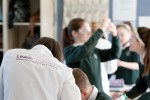
Overwhelmed by the available chemistry resources? Looking for new chemistry teaching ideas? Elementary Articles is the place for chemistry, education, and everything else.
Elementary Articles is the official blog for the RSC's Learn Chemistry – your home for chemistry education resources and activities.
Latest Posts